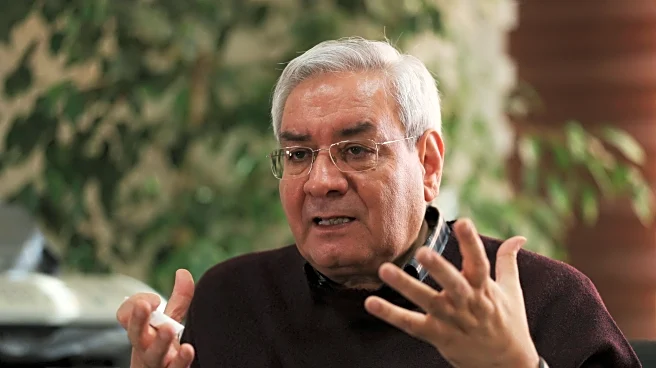What's Happening?
The remains of a hostage killed in Gaza were transferred to Israel on Wednesday evening for identification. The body was handed over to the Red Cross by Hamas in northern Gaza and then delivered to the Israeli Defense Forces (IDF) before being transferred across
the border. This development follows the return of IDF soldier Staff Sgt. Itay Chen's remains, who was killed during fighting on October 7. Chen's body was previously handed over by Hamas and identified in Israel. The latest transfer involves another fallen hostage, whose remains were located by Hamas in the Shijaiyah neighborhood of Gaza City. The body is expected to be taken to the National Center of Forensic Medicine in Tel Aviv for identification.
Why It's Important?
The return of hostage remains underscores the ongoing humanitarian and diplomatic challenges in the region. It highlights the efforts of international organizations like the Red Cross in facilitating such transfers amidst conflict. The identification and repatriation of remains are crucial for closure and justice for the families involved. This event also reflects the broader geopolitical tensions between Israel and Hamas, impacting regional stability and international relations. The involvement of the Red Cross signifies the importance of neutral parties in conflict resolution and humanitarian aid.
What's Next?
The identification process at the National Center of Forensic Medicine will determine the next steps for the repatriation of the remains. Israeli authorities may continue negotiations for the return of other hostages and remains held by Hamas. The situation may prompt further diplomatic efforts to address the humanitarian aspects of the conflict. Families of hostages and the Israeli government are likely to push for more comprehensive solutions to prevent future abductions and ensure the safe return of individuals caught in conflict zones.
Beyond the Headlines
The return of hostage remains raises ethical questions about the treatment of hostages and the responsibilities of conflicting parties under international law. It also highlights the cultural and emotional impact on families and communities affected by such tragedies. Long-term implications may include shifts in public opinion regarding the conflict and increased pressure on governments to prioritize humanitarian concerns in their foreign policy agendas.















